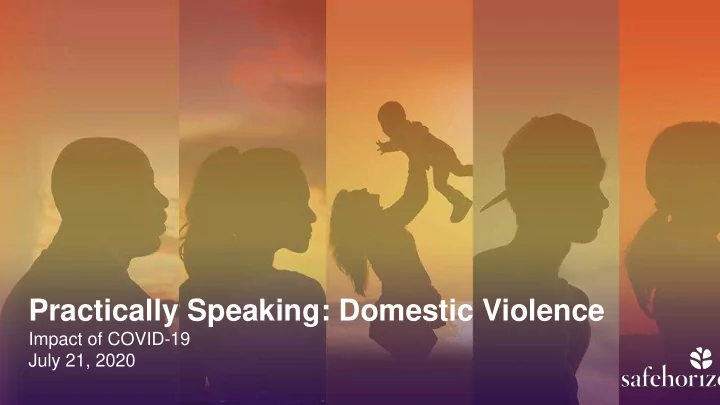

Practically Speaking: Domestic Violence Impact of COVID-19 July 21, 2020
Nice to Meet You
Types of Abuse
Domestic Violence Risk Factors • Isolation • Limited Support • Substance Use • Unemployment • Firearm Possession • Disability • Poverty, Racism, Systemic Oppression • Polyvictimization
Safety Assessment Considerations • During the pandemic, h ow might… • existing safety plans/resources/engagement be impacted • isolation be used as an abuse tactic • the virus be used as an abuse tactic • financial abuse intensify • children be harmed or used to control/manipulate • support animals/pets be harmed • access to information/news be restricted • access to phone, internet be limited or unsafe • access to groceries, medications, supplies be restricted • trauma history impact current emotional safety 5
Practice Recommendations 1. Provide compassion, non-judgment, anti-oppressive approach to engagement 2. Offer safe remote and in-person options, letting survivors know what to expect in these settings 3. Proactively identify current information for referrals, hotlines, shelters, courts, etc. 4. Ask about safety, privacy in the moment during calls/remote interactions 5. Listen for verbal and non-verbal cues; use organic, open-ended questions to ask about what you notice or what they are afraid might happen 6. Authentic, Realistic, Time-Oriented safety planning options 7. Attend to other basic, immediate social, financial, emotional, biological safety needs expressed COMPASSION, NON-JUDGMENT OF SURVIVOR CHOICES 6
Safe Horizon is Here for Survivors! All Domestic Violence Shelters are operating. Please call our Hotline Hotline: 1-800-621-HOPE (4673) Chat with an advocate: visit Safehorizon.org/SafeChat Counseling Center are providing services remotely. Call 347-328-8110 for more info. Visit https://www.safehorizon.org/emergency for more courts and other program information 7
Recommend
More recommend